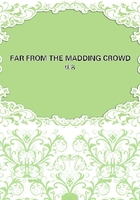
第48章
Perplexity - binding the Shears - A Quarrel
`He is so disinterested and kind to offer me all that I can desire,' Bathsheba mused.
Yet Farmer Boldwood, whether by nature kind or the reverse to kind, did not exercise kindness here. The rarest offerings of the purest loves are but a self-indulgence, and no generosity at all.
Bathsheba, not being the least in love with him, was eventually able to look calmly at his offer. It was one which many women of her own station in the neighbourhood, and not a few of higher rank, would have been wild to accept and proud to publish. In every point of view, ranging from politic to passionate, it was desirable that she, a lonely girl should marry, and marry this earnest, well-to-do, and respected man. He was close to her doors: his standing was sufficient: his qualities were even supererogatory.
Had she felt, which she did not, any wish whatever for the married state in the abstract, she could not reasonably have rejected him, being a woman who frequently appealed to her understanding for deliverance from her whims.
Boldwood as a means to marriage was unexceptionable: she esteemed and liked him, yet she did not want him. It appears that ordinary men take wives because possession is not possible without marriage, and that ordinary women accept husbands because marriage is not possible without possession; with totally differing aims the method is the same on both sides. But the understood incentive on the woman's part was wanting here. Besides, Bathsheba's position as absolute mistress of a farm and house was a novel one, and the novelty had not yet begun to wear off.
But a disquiet filled her which was somewhat to her credit, for it would have affected few. Beyond the mentioned reasons with which she combated her objections, she had a strong feeling that, having been the one who began the game, she ought in honesty to accept the consequences. Still the reluctance remained. She said in the same breath that it would be ungenerous not to marry Boldwood, and that she couldn't do it to save her life.
Bathsheba's was an impulsive nature under a deliberate aspect. An Elizabeth in brain and a Mary Stuart in spirit, she often performed actions of the greatest temerity with a manner of extreme discretion. Many of her thoughts were perfect syllogisms; unluckily they always remained thoughts. Only a few were irrational assumptions; but, unfortunately, they were the ones which most frequently grew into deeds.
The next day to that of the declaration she found Gabriel Oak at the bottom of her garden, grinding his shears for the sheep-shearing. All the surrounding cottages were more or less scenes of the same operation; the scurr of whetting spread into the sky from all parts of the village as from an armoury previous to a campaign. Peace and war kiss each other at their hours of preparation - sickles, scythes, shears, and pruning-hooks ranking with swords, bayonets, and lances, in their common necessity for point and edge.
Cainy Ball turned the handle of Gabriel's grindstone, his head performing a melancholy see-saw up and down with each turn of the wheel. Oak stood somewhat as Eros is represented when in the act of sharpening his arrows: his figure slightly bent, the weight of his body thrown over on the shears, and his head balanced sideways, with a critical compression of the lips and contraction of the eyelids to crown the attitude.
His mistress came up and looked upon them in silence for a minute or two; then she said--`Cain, go to the lower mead and catch the bay mare. I'll turn the winch of the grindstone. I want to speak to you, Gabriel.'
Cain departed, and Bathsheba took the handle. Gabriel had glanced up in intense surprise, quelled its expression, and looked down again. Bathsheba turned the winch, and Gabriel applied the shears.
The peculiar motion involved in turning a wheel has a wonderful tendency to benumb the mind. It is a sort of attenuated variety of Ixion's punishment, and contributes a dismal chapter to the history of gaols. The brain gets muddled, the head grows heavy, and the body's centre of gravity seems to settle by degrees in a leaden lump somewhere between the eyebrows and the crown. Bathsheba felt the unpleasant symptoms after two or three dozen turns.
`Will you turn, Gabriel, and let me hold the shears?' she said. `My head is in a whirl, and I can't talk.'
Gabriel turned. Bathsheba then began, with some awkwardness, allowing her thoughts to stray occasionally from her story to attend to the shears, which required a little nicety in sharpening.
`I wanted to ask you if the men made any observations on my going behind the sedge with Mr Boldwood yesterday?'
`Yes, they did,' said Gabriel. `You don't hold the shears right, miss - I knew you wouldn't know the way - hold like this.'
He relinquished the winch, and enclosing her two hands completely in his own (taking each as we sometimes clasp a child's hand in teaching him to write), grasped the shears with her. `Incline the edge so' he said.
Hands and shears were inclined to suit the words, and held thus for a peculiarly long time by the instructor as he spoke.
`That will do,' exclaimed Bathsheba. `Loose my hands. I won't have them held! Turn the winch.'
Gabriel freed her hands quietly, retired to his handle, and the grinding went on.
`Did the men think it odd?' she said again.
`Odd was not the idea, miss.'
`What did they say?'
`That Farmer Boldwood's name and your own were likely to be flung over pulpit together before the year was out.'
`I thought so by the look of them! Why, there's nothing in it. A more foolish remark was never made, and I want you to contradict it: that's what I came for.'